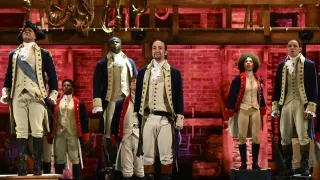
Sep 6
South Park’s Trump-Satan Romance Ignites Satirical Sparks, Controversy
READ TIME: 3 MIN.
The long-running animated series “South Park” has never shied away from controversy, but its latest storyline—depicting a romantic and sexual relationship between former President Donald Trump and Satan—has taken even seasoned fans by surprise. The current season has featured scenes of Trump and Satan in bed together, culminating in a dramatic revelation: Satan is pregnant with Trump’s child. The ongoing story arc has sparked a national conversation about satire, politics, and queer representation in media .
The season’s narrative reached a crescendo when the elementary school girls of South Park performed a fictional “Labulus dark ritual” to summon Trump and Satan, prompting the couple to admit their ongoing relationship. In a moment blending dark humor and soap-opera melodrama, Satan confesses: “I am bound to him. Yes, we are together. We’ve been together for months. I want to leave him, but I can’t—because I’m pregnant. I’m forced to stay in this situation for several more years” .
The storyline is classic “South Park”: irreverent, boundary-pushing, and designed to lampoon current political figures through the lens of absurdist fiction. The show’s writers have a history of employing queer-coded narratives—Satan’s previous on-screen romance with Saddam Hussein being a notable example—to both satirize cultural anxieties and comment on the underlying power dynamics of public life .
Reaction to the storyline has been swift and polarized. Fox News and prominent right-wing celebrities, such as Kid Rock, responded with a mix of mockery and feigned celebration. Kid Rock was quoted as saying, “I honestly didn’t think the president wasn’t fucking Satan, but now knowing that he was this whole time, I’m just so happy,” a line delivered with both sarcasm and glee .
The White House, meanwhile, issued an official statement denouncing the episode: “South Park hasn’t been relevant for more than 20 years, going on to say the show is hanging on by a thread by uninspired ideas in an attempt to stay controversial” .
On social media platforms like X (formerly Twitter) and Instagram, the hashtag #TrumpSatan trended throughout the week, with users debating whether the storyline is a bold exercise in queer visibility or simply another example of shock humor. Some fans praised the show for lampooning political power through a same-sex relationship, while others questioned whether the depiction trivializes queer experiences for comic effect .
For many queer viewers and advocates, the Trump-Satan love affair raises complex questions about representation. While “South Park” has included queer characters and themes throughout its history, often subverting heteronormative expectations, the line between satire and stereotype remains a subject of ongoing debate. Dr. Jules Cohen, a media studies professor specializing in queer representation, explained: “On one hand, ‘South Park’ introduces same-sex and non-traditional relationships into mainstream conversation, which can be empowering. On the other hand, the show’s satirical tone sometimes risks reinforcing harmful tropes if not handled thoughtfully” .
Satan’s pregnancy storyline also touches on themes of bodily autonomy and queer family structures, albeit through a supernatural and exaggerated lens. Queer advocacy groups have called attention to the importance of nuanced portrayals—especially in media with a large, diverse audience—while acknowledging the role of satire in challenging social and political norms .
This is not the first time “South Park” has ventured into queer territory. The show has previously depicted storylines involving same-sex relationships (such as Satan’s romance with Saddam Hussein), gender transition, and critiques of homophobia and transphobia. Not all of these narratives have been met with universal praise; some have been criticized for relying on stereotypes or for using queer identities as punchlines .
However, defenders argue that “South Park’s” equal-opportunity satire lampoons everyone—including the powerful and the marginalized—highlighting the absurdities of prejudice and the performative nature of political morality.
The queer community’s response to the Trump-Satan romance has been mixed but vibrant. Some viewers have embraced the storyline as a subversive challenge to conservative narratives about family, sexuality, and power. Others have expressed concern that the show’s comedic framing might overshadow real challenges, especially in a political climate increasingly hostile to queer rights .
Organizations such as GLAAD have not issued formal statements, but prominent activist voices on social media have emphasized the need for both critical engagement and creative freedom in queer media representation. As one user wrote on Instagram: “If we can’t laugh at the absurdity of power—including our own stories—then we’re letting them win. But we also deserve stories that reflect our lives with dignity and depth”.






